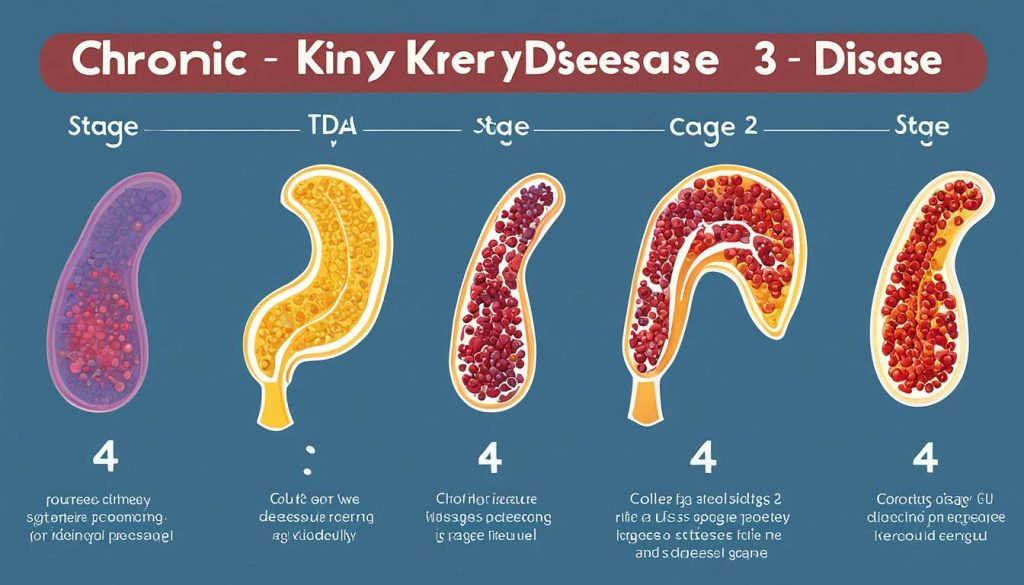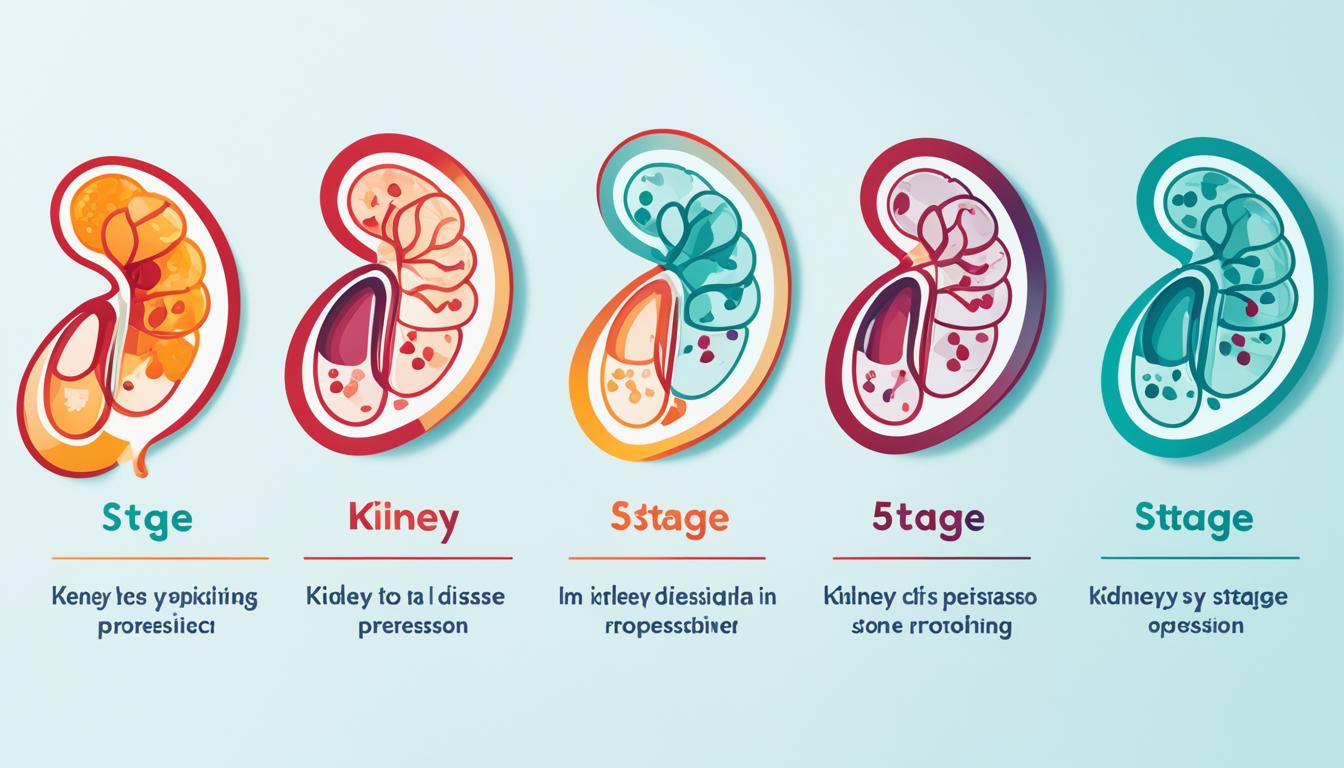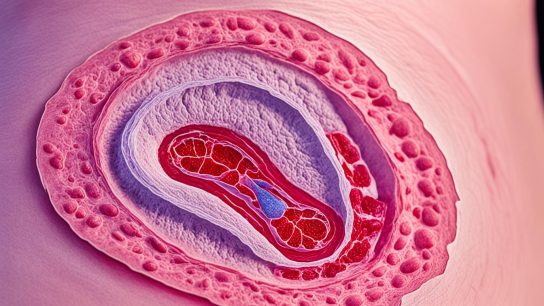Are you wondering how long it takes for kidney disease to progress from stage 3 to stage 4? Understanding the timeline of kidney disease progression is crucial for effective management and intervention. Let’s explore the kidney disease progression timeline and what factors contribute to the advancement from stage 3 to stage 4.
A retrospective cohort study revealed that around half of the patients with stage 3 chronic kidney disease (CKD) progressed to stage 4 or 5 within a span of 10 years. This indicates that the transition from stage 3 to stage 4 can take a considerable amount of time. Factors such as the degree of albuminuria, presence of microscopic haematuria, and being in stage 3B CKD were identified as independent predictors of progression to stage 4.
To visualize the progression of kidney disease, refer to the following kidney disease timeline:
- Stage 1: Kidney damage with normal or high eGFR
- Stage 2: Mild reduction in eGFR
- Stage 3: Moderately reduced eGFR (further divided into stage 3a and stage 3b)
- Stage 4: Severe reduction in eGFR
- Stage 5: Kidney failure or end-stage renal disease
It’s essential to be proactive in managing kidney disease and taking steps to slow down its progression. Regular monitoring, adherence to medications, and maintaining a healthy lifestyle can greatly impact the transition from stage 3 to stage 4. Consult with healthcare professionals to develop a personalized treatment plan best suited to your situation.
Keep in mind that every individual’s journey with kidney disease is unique. By staying informed and working closely with your healthcare team, you can optimize your kidney health and improve your quality of life.
Understanding the Stages of Chronic Kidney Disease
Chronic kidney disease (CKD) is a condition that progresses through different stages, each characterized by varying levels of kidney damage and function. These stages are determined based on the estimated glomerular filtration rate (eGFR) test, which measures how well the kidneys are filtering waste from the blood.

Stage 3 is a critical juncture in the progression of kidney disease. At this stage, the eGFR ranges from 30 to 59, indicating mild to moderate kidney damage. Stage 3 is further divided into two subcategories: stage 3a (eGFR between 45 and 59) and stage 3b (eGFR between 30 and 44). In this stage, the kidneys are not functioning as well as they should, and symptoms may begin to manifest.
Common symptoms of stage 3 kidney disease include:
- Weakness
- Fatigue
- Swelling in the hands or feet
It is important to note that symptoms may vary from person to person, and some individuals may not experience any symptoms in stage 3. Regular monitoring of kidney function and consultation with a healthcare professional are crucial for timely management and intervention.
Progression of Stage 3 Kidney Disease
Progression of stage 3 kidney disease is an important concern for individuals diagnosed with this condition. While the rate of progression can vary, it’s essential to understand the factors that may influence the advancement from stage 3 to stage 4 kidney disease.
In a study conducted on stage 3 chronic kidney disease (CKD) patients, approximately 17.3% of them progressed to stage 4 over a follow-up period. However, it is important to note that with appropriate treatment and lifestyle changes, many people in stage 3 do not progress to stage 4 or stage 5. The progression rate can be influenced by various factors, including the presence of albuminuria and microscopic haematuria.
To better grasp the clinical timeline and progression of stage 3 to stage 4 kidney disease, it is vital to consult a healthcare professional. Each individual’s situation may differ, and personalized medical advice and monitoring are necessary to manage the condition effectively.
If you have been diagnosed with stage 3 kidney disease and wish to understand your specific risks and prognosis, it is crucial to work closely with your healthcare team. With early detection, proper medical guidance, and lifestyle modifications, you can actively participate in slowing down the progression of kidney disease and improving your overall health and well-being.

The Impact of Stage 3 Kidney Disease Progression
Symptoms and Complications of Stage 3 Kidney Disease
As stage 3 kidney disease progresses, several symptoms may start to manifest, indicating a decline in kidney function and the need for closer medical attention. Identifying these symptoms early on allows for timely intervention and management of the condition. The most common symptoms associated with stage 3 kidney disease include:
- Weakness: Patients may experience generalized weakness and fatigue as the kidneys struggle to perform their essential functions.
- Fatigue: Feelings of tiredness and low energy levels may become more prominent, affecting day-to-day activities.
- Swelling in the hands or feet: Edema, or the accumulation of fluid in the extremities, can occur due to the impaired filtration capacity of the kidneys.
- High blood pressure: Hypertension is often observed in individuals with stage 3 kidney disease, as the kidneys play a crucial role in regulating blood pressure.
While these symptoms are noteworthy, it is important to remember that they can also be indicative of other medical conditions. Therefore, a thorough evaluation by a healthcare professional is necessary to determine the underlying cause.
In addition to the symptoms mentioned above, stage 3 kidney disease can lead to various complications, further impacting an individual’s health and quality of life. Some of the common complications observed in stage 3 kidney disease patients include:
- Bone disease: Abnormalities in calcium and phosphate metabolism due to impaired kidney function can lead to weak bones and an increased risk of fractures.
- Cardiovascular problems: Kidney disease often coincides with an increased risk of cardiovascular events such as heart attacks and strokes.
- Anemia: Inadequate production of red blood cells by the kidneys can result in anemia, leading to symptoms such as fatigue and shortness of breath.
- Fluid overload: The compromised fluid regulation in stage 3 kidney disease may cause fluid retention, leading to swelling, difficulty breathing, and increased strain on the heart.

Understanding and monitoring these symptoms and complications is crucial for effective management of stage 3 kidney disease. Regular check-ups and consultations with healthcare professionals help in developing personalized treatment plans and preventing further deterioration.
Lifestyle Recommendations for Stage 3 Kidney Disease
Maintaining a healthy lifestyle is crucial for managing stage 3 kidney disease. By making certain lifestyle changes, you can optimize your kidney health and improve your overall well-being.
Eat a Balanced Diet
Following a balanced diet is essential for supporting kidney health. Focus on consuming a variety of fresh fruits, vegetables, whole grains, and lean proteins. Limit your intake of processed foods, saturated fats, and sugary beverages. Consult with a healthcare professional or kidney dietitian for personalized dietary recommendations.
Limit Salt and Protein Intake
Reducing your salt and protein intake can help decrease the strain on your kidneys. Avoid adding extra salt to your meals and choose low-sodium alternatives when possible. Additionally, opt for lean protein sources such as fish, poultry, and legumes.
Stay Hydrated
Proper hydration is essential for kidney health. Aim to drink an adequate amount of water throughout the day to help flush out toxins and promote optimal kidney function.
Quit Smoking
Smoking can harm your kidneys and contribute to the progression of kidney disease. Quitting smoking can improve your kidney health as well as reduce the risk of other health complications.
Exercise Regularly
Engaging in regular physical activity is beneficial for overall health, including kidney health. Aim for at least 30 minutes of moderate-intensity exercise, such as brisk walking or cycling, on most days of the week. Consult with your healthcare professional before starting any new exercise routine.
Manage Underlying Conditions
If you have high blood pressure or diabetes, it is crucial to manage these conditions effectively. Keeping these conditions well-controlled can help prevent further damage to your kidneys.
Treatment Options for Stage 3 Kidney Disease
Treatment for stage 3 kidney disease focuses on managing symptoms, slowing down the progression of the disease, and preventing complications. A combination of lifestyle changes, medication management, and regular monitoring plays a crucial role in the overall management and intervention of stage 3 kidney disease.
Lifestyle Changes:
- Adopting a healthy diet: A kidney-friendly diet with controlled protein, sodium, and potassium intake can help reduce the strain on the kidneys and manage blood pressure levels. Consultation with a kidney dietitian is recommended for personalized dietary recommendations.
- Regular physical activity: Engaging in regular exercise can improve overall well-being, maintain a healthy weight, and support kidney health. However, it is essential to consult a healthcare professional before starting any exercise regimen.
Medication Management:
- Controlling underlying conditions: Medications may be prescribed to manage conditions like high blood pressure and diabetes, which can contribute to kidney damage. Adhering to prescribed medications and regularly monitoring blood pressure and blood sugar levels are crucial.
- Specific treatments for kidney disease: In some cases, medications may be prescribed to manage specific complications or slow down the progression of stage 3 kidney disease. A nephrologist will assess the individual’s condition and determine the appropriate treatment plan.
Regular Monitoring and Follow-up:
Regular monitoring of kidney function, blood pressure, and overall health is essential for effective management of stage 3 kidney disease. This involves scheduled check-ups with a healthcare professional, particularly a nephrologist specializing in kidney diseases. They will assess the condition’s progression, adjust treatment plans if necessary, and provide guidance on lifestyle modifications and medication management.
| Treatment Options | Benefits |
|---|---|
| Lifestyle Changes | – Promote overall well-being – Reduce strain on the kidneys – Manage blood pressure levels |
| Medication Management | – Control underlying conditions – Slow down disease progression |
| Regular Monitoring and Follow-up | – Track kidney function – Adjust treatment plans as required – Provide professional guidance |

How Long Does It Take to Go From Stage 3 to Stage 4 Kidney Disease?
While some individuals with stage 3 kidney disease may eventually progress to stage 4, there are proactive measures that can be taken to slow down the progression of the disease and protect kidney function. By closely monitoring blood pressure, adopting a healthy lifestyle, following recommended dietary guidelines, and adhering to prescribed medications, patients can significantly reduce the risk of advancing to stage 4 and experiencing further kidney damage.
Regular communication with healthcare professionals is essential in managing stage 3 kidney disease and implementing effective interventions. By working closely with nephrologists and other healthcare providers, patients can receive personalized guidance, monitor their progress, and make informed decisions about their treatment plan.
- Closely monitor blood pressure: High blood pressure can accelerate the progression of kidney disease. Regular check-ups and follow-ups with healthcare professionals are crucial for monitoring blood pressure levels and adjusting medication as needed.
- Maintain a healthy lifestyle: Adopting healthy habits such as maintaining a balanced diet, engaging in regular physical activity, and avoiding excessive alcohol consumption can contribute to overall well-being and slow down the progression of kidney disease.
- Follow recommended dietary guidelines: A kidney-friendly diet, low in sodium, protein, and phosphorus, can help protect the kidneys and prevent further damage. Consultation with a registered dietitian who specializes in kidney disease is recommended for personalized dietary recommendations.
- Adhere to prescribed medications: Taking medications as prescribed by healthcare professionals is crucial in managing underlying conditions and preventing complications. This may include medications to control blood pressure, manage diabetes, or treat other conditions that can impact kidney health.
By implementing these preventive measures, individuals with stage 3 kidney disease can significantly slow down the progression of the disease and improve their quality of life. It is important for patients to actively participate in their healthcare journey, collaborate with healthcare professionals, and prioritize kidney health through lifestyle modifications and appropriate medical management.
Lifestyle Recommendations for Managing Stage 3 Kidney Disease
| Recommendation | Description |
|---|---|
| Follow a balanced diet | Avoid foods high in sodium, protein, and phosphorus. Focus on consuming a variety of fruits, vegetables, whole grains, and lean protein sources. |
| Limit salt intake | Reduce sodium intake to help manage blood pressure and prevent fluid retention. Avoid processed and packaged foods that are high in sodium. |
| Stay hydrated | Drink an adequate amount of fluids, as recommended by healthcare professionals. Water is usually the best choice, but consult with a healthcare provider for personalized guidance. |
| Quit smoking | Smoking can worsen kidney function and increase the risk of cardiovascular complications. Seek support and resources to quit smoking. |
| Exercise regularly | Engage in physical activity such as walking, swimming, or cycling to improve overall fitness and kidney health. Consult with a healthcare professional before starting any exercise program. |
Conclusion
The transition period from stage 3 to stage 4 kidney disease can vary for each individual. Factors such as the presence of albuminuria, microscopic haematuria, and overall disease management influence the duration of this transition. It is crucial to consult with healthcare professionals and follow their guidance to effectively manage stage 3 kidney disease and prevent or delay progression to stage 4.
By implementing a comprehensive treatment plan, including lifestyle modifications and adherence to prescribed medications, individuals can optimize their kidney health and improve their overall quality of life. Regular communication and monitoring with healthcare professionals, particularly nephrologists, are vital in ensuring appropriate interventions and preventing further kidney damage.
Remember, there is no predetermined timeline for disease progression. With early detection, proper management, and a proactive approach, individuals can slow down the advancement of kidney disease and enjoy a healthier life. Focus on maintaining a healthy lifestyle, following medical advice, and seeking regular check-ups to effectively navigate the staging transition period and enhance kidney health.




